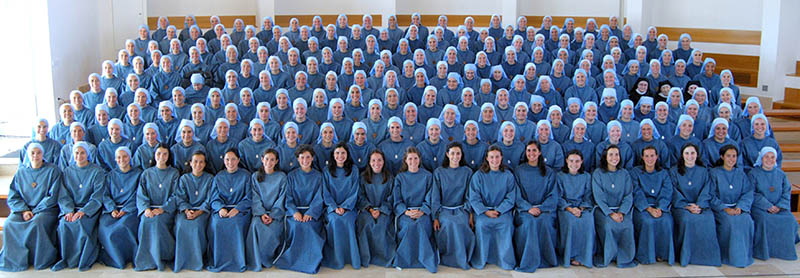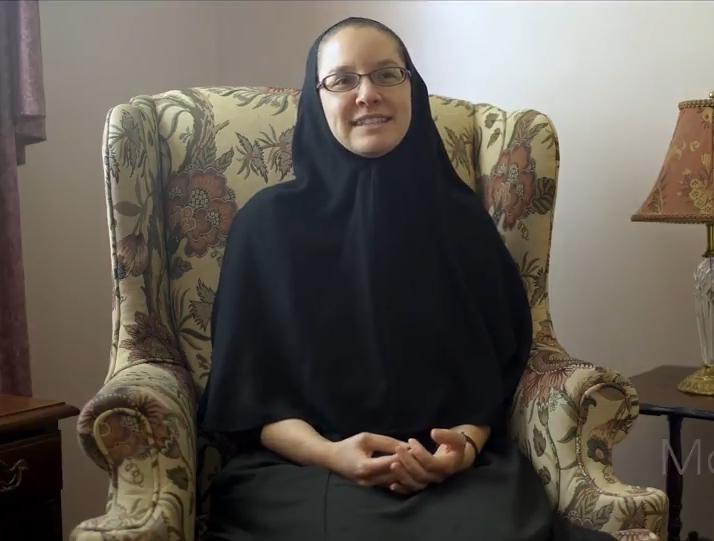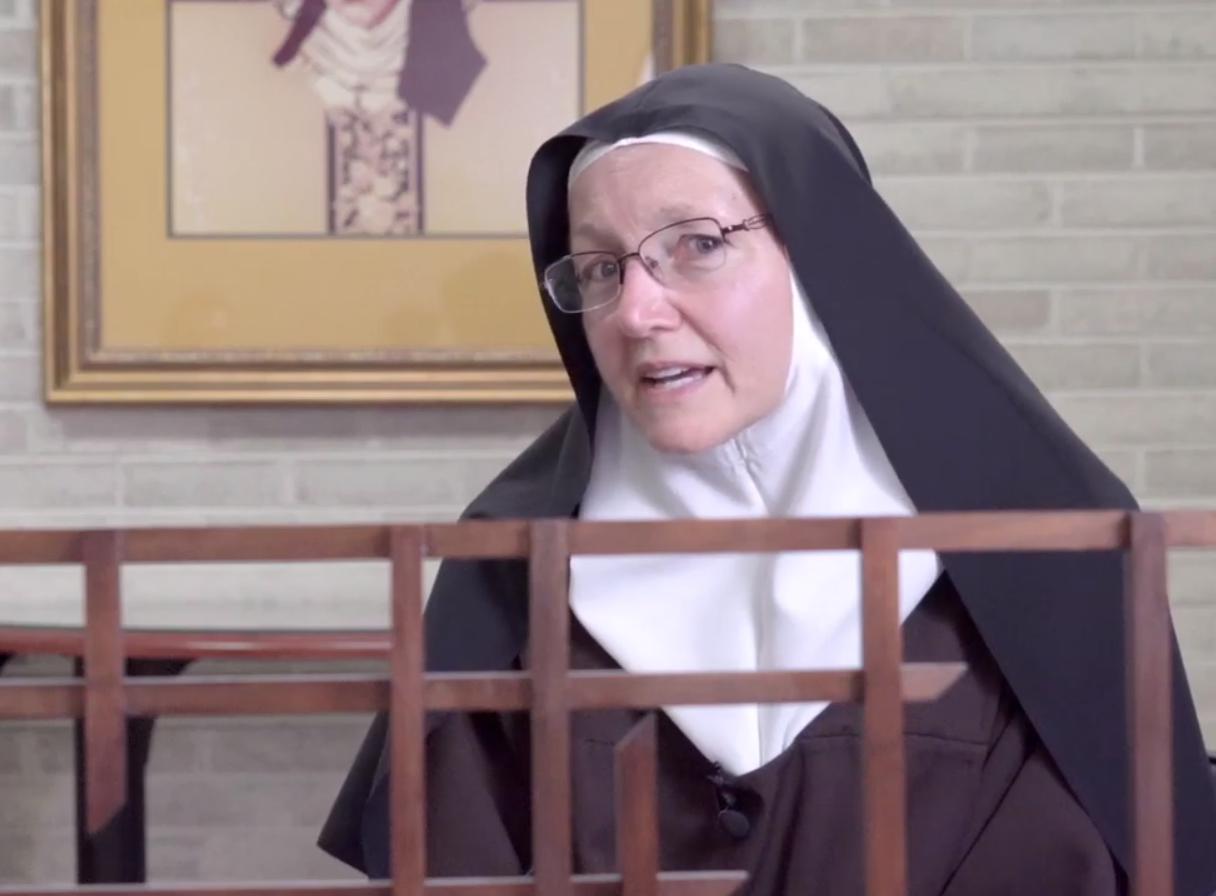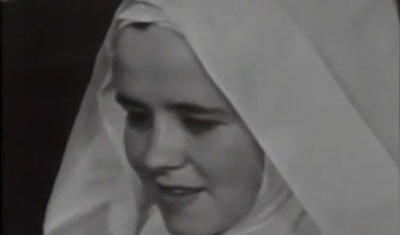Discerning Religious Life
Saint Bernard of Clairvaux once estimated that about one out of three Catholics (~33%) have a vocation to the consecrated life. Yet today, less one in every twenty-thousand Catholics (~0.005%) are consecrated religious. These statistics, if even remotely accurate, help us to better understand the difficulty Catholics face today when discerning a religious vocation, that is; many either do not hear the call of God, or hear but do not listen.![]()
A Natural Desire for Marriage
What then, is the reason for such a disparity? First, we may observe that marriage has an immediate "advantage" over celibacy, in that it is in accord with man's natural desires. In other words, all men and women have a deep innate desire to love and be loved by another person. Earthly marriage feels natural because we are all destined to one day be wed to our heavenly Bridegroom; it is what we were all created for. It is therefore easy to mistakely confuse these natural desires as a call to the married state, when in fact we may not be. After all, it is easier for us to see, feel, and experience "spouse" in a person, than it is to see, feel, and experience spouse in its mystical reality. This natural inclination is further exacerbated by the society in which we live, which obsesses on dating and relationships to near compulsion. Marriage is often assumed to be that natural next step in everyone's life, like getting a driver's license, or buying a first house. Discerning a vocation therefore requires great determination; to say "no" to what is natural, tangible, and before our eyes, and "yes" to a seemingly remote ideal. It should be no surprise why the Catholic Church prays for vocations with such frequency. The Church needs good men and women to step forward, to look beyond ther natural desires, for love of a greater Spouse, their Bridegroom Jesus Christ, to become wholly His alone.![]()
"The Heart is Deceitful"
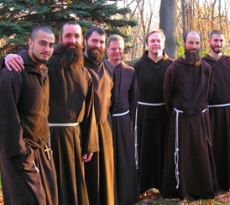
Capuchin Franciscans
Saint Ignatius of Loyola: "If a person thinks of embracing a secular life, he should ask and desire more evident signs that God calls him to a secular life, than if there were question of embracing the evangelical counsels; for Our Lord Himself has evidently exhorted us to embrace His counsels."
Discernment, initially, might then be considered a test of the will, that is to say to oneself; "I love Jesus enough to sacrifice what I so deeply desire; marriage. I therefore submit myself to the direction of His Church. I do not trust in my feelings. But I choose the better way, until God reveals otherwise." This is not to say, however, that a vocation to the religious life should be forced. Nor are we saying that discernment is purely an intellectual exercise devoid of any input from the heart. Rather, the point being made here, is one of emphasis, that is; of defaulting to religous life in the beginning---at least exploring the possibility seriously---recognizing our powerful human tendencies that pull us away from a religious vocation, not to mention our triple enemies (the world, flesh, and the devil) that we must contend with. Scripture describes the voice of God as a "gentle wind," a "still small voice," barely perceptible if we are distracted and pulled in a thousand directions. A vocation begins as a delicate seed, which must be nurtured and cultivated amid thorns and bramble, before growing into a towering tree. As Saint Paul counsels us; "Are you free of a wife? Then do not look for a wife. If you marry, however, you do not sin..but such people will experience affliction in their earthly life, and I would like to spare you that." (1 Cor 7) A good general Ignatian guideline, is to never make big decisions in moments of disquiet, but rather, to make them after long hours of prayer, when one feels most calm, peace, and clarity.
![]()
The Best Marriage
It is therefore necessary to understand that religious life is not a "giving up" of marriage. Rather, as we have said elsewhere, it is an elevation of marriage, beyond this world, towards its ultimate fulfillment. It is to live, here on earth, an anticipation of our final destiny in heaven. Instead of marrying a fallible person--who would ultimately disspoint us if we sought fullfillment only in them--religious marry Our Lord Himself, Who alone is able to fullfill and satisfy the longing in our hearts. What better Bridegroom can one have than Jesus Christ Himself? Instead of raising children, religious adopt every soul as their spiritual child. Instead of devoting one's life towards the salvation of a family, religious devote their lives to the salvation of the world. In this way, consecrated life is everything that marriage is, but elevated to a higher perfection. It redirects man's gaze from the particular (the souls in my family) to the universal (the souls in the world).When a mother explained this in simplified terms to her six year old daughter, the child responded quite simply; "Why would anyone want to marry a man when they could marry God?" The logic of this child, although somewhat simplistic, indeed speaks a great truth. Jesus Christ is the perfect spouse of every soul. And while this may be easier for the female heart to accept, it is no less true for men as well (The saints speak of the soul as feminine, given that the Church is Bride). The better life, according to Our Lord, is to sit at His feet like the Magdalene, rather than Martha, divided over many temporal matters (Luke 10:42).
![]()
How do I Know for Sure?
One need not have absolute certainty of a calling to the religious life in order to have a genuine vocation. If there is but a seed of desire within the soul, then this is enough reason to water and cultivate this seed, to see whether is takes root or not. And the best way to have greater certainty, is to visit the communities in person, many of them. Do not stop with the first one and say "I just didn't feel at peace there." That is not enough. You must put in the same effort as couples do when dating and looking for a spouse. Imagine giving up on the idea of marriage altogether after one date! And besides, you must expect a lack of peace when visiting communities, since many today are not living up to the greatness to which they are called. It takes time to find "the one."St. Francis De Sales: "To know whether God will have a person become a religious it is not to be expected that God Himself should speak, or send an angel from heaven to signify His will. It is not necessary that ten or twelve confessors should examine whether the vocation is to be followed. But it is necessary to correspond with the first movement of the inspiration, and to cultivate it, and then not to grow weary if disgust or coldness should come on. If a person acts thus, God will not fail to make all succeed to His glory. Nor ought we to care much from what quarter the first movement comes. The Lord has many ways of calling His servants."
Saint Teresa of the Andes: " We [religious] no longer belong to the world. Jesus has taken us from the world, that we may follow Him more closely, and He says to us; "If anyone would come after Me, let him take up his cross and follow Me." And so, Sister, let's walk after Him. Love demands this, since He has chosen us to make us entirely His own. And when the weight of the cross weighs us down, let us call upon Jesus to help us. [...] We do not belong to the worldly spirit any longer, for Jesus has taken from us the spirit of the world in order to clothe us with His Divine Spirit. And what is that spirit...? The spirit of the Cross, the renunciation of our selfish impulses and demands of the flesh; the denial of our appetites and tastes, comforts, etc."
![]()
Every Person has the Capacity To Become A Saint
Realizing that discouragement is a tool of our common adversary, we must remind ourselves that all things done for the love of God will bear abundant fruit, especially if the sacrifice is great "every one that hath left house, brothers, sisters, father, mother, wife, children, or lands for My sake, shall receive a hundred times as much" (Matt 19:29). Thus, we need not fear our own weaknesses, for the graces we receive in religious life will be sufficient to become saints, provided we correspond. As Our Lord told Saint Faustina; "Do not be guided by feeling, because it is not always under your control; but all merit lies in the will." Indeed, becoming a saint--or, loving God to the point of total conformity to His will--requires nothing other than a persistent good will to do so, which begins first with a humble heart. So it is a good sign that one feels unworthy of the religious life. It is precisely such people who make the best religious; for only the humble will be able to obtain graces from heaven.
Poor Clare Nun (Day of Solemn Profession)
Diary of Saint Faustina, p.134: "Let no soul, even the most miserable, fall prey to doubt; for, as long as one is alive, each one can become a great saint, so great is the power of God's grace. It remains only for us not to oppose God's actions."
"On a certain occasion, I saw a person about to commit a mortal sin. I asked the Lord to send me the greatest torments so that that soul could be saved. Then I suddenly felt a terrible pain of a crown of thorns on my head. It lasted for quite a long time, but that person remained in the Lord's grace... O my Jesus, how very easy it is to become holy! All that is needed is a bit of good will. Jesus sees this little bit of good will in the soul, He hurries to give Himself to the soul, and nothing can stop Him, neither short comings or falls - absolutely nothing. Jesus is anxious to help that soul, and if it is faithful to this grace from God, it can very soon attain the highest holiness possible for a creature here on earth. God is very generous and does not deny His grace to anyone. Indeed He gives more than what we ask of Him."
"O God, how easy it is to know Your will in the convent! We religious have God's will set clearly before our eyes from morning till night, and in moments of uncertainty we have our superiors through whom God speaks. [...] My life is not drab or monotonous, but it varied like a garden of fragrant flowers, so that I don't know which flower to pick first, the lily of suffering, or the rose of love of neighbor, or the violet of humility" - Diary, p. 138
Diary of Saint Faustina: "Jesus says: 'This firm resolution to become a saint is extremely pleasing to Me. I bless your efforts and will give you opportunities to sanctify yourself. Be watchful that you lose no opportunity that My providence offers you for sanctification. If you do not succeed in taking advantage of an opportunity, do not lose your peace, but humble yourself profoundly before Me and, with great trust, immerse yourself completely in My mercy. In this way, you gain more than you have lost, because more favor is granted to a humble soul than the soul itself asks for..."
![]()
Reasons NOT to Enter Religious Life
Perhaps the most common error that people make in entering religious life is to treat it as an escape from something else, whether due to failed relationships, or the feeling that one is unlovable, or a disordered sexuality, or whatever the reason may be. As we have said above, and as should be obvious by now, religious life ought to be something we run toward, not due to something we are running away from. It should never be used as a fall-back, because we think we no one could love us, or we fear growing old alone. Such reasons denigrate the dignity of religious life and are an insult to Christ to Whom religious are wed. The best vocations are precisely those who sacrifice the most; those who would have made the best wives and mothers, and the best husbands and fathers; for great indeed must be their love to renounce what they so easily could have thrived and flourished doing. And what is more, they bring their feminine genius and their authentic masculinity into the community, where it flourishes and fecundates all the more. A community of "undesirable" women or effeminate men, who are there only because they were unable to find a spouse, would not only harm fraternal unity, but also provide a poor witness to the world of the greatness of consecrated life.
We would also do well to warn again the prideful as well, who are unable to merit any graces due to their pride. Everything in religious life depends on humility, because everything depends on prayer. And God only listens to humble hearts; "God resists the proud, but gives grace to the humble." (James 4:6). We must therefore empahtically state: An obstinantely proud person does not have a vocation to the consecrated life. For them, it is better not to enter religious life, lest they damage the community they enter. A single prideful soul, says Saint Teresa of Avila, can cause great harm to a community. But a single humble soul, will edify, nourish, and strengthen the other members.Saint Francis De Sales: “Many enter religion without knowing why they do so. They come into a convent parlour, they see nuns with calm faces, full of cheerfulness modesty and content, and they say to themselves: ‘What a happy place this is! Let us come to it. The world frowns on us; we do not get what we want there.' Others come in order to find peace, consolation and all sorts of sweetness, saying in their minds: ‘How happy religious are! They have got safe away from all their home worries; from their parents continual ordering about and fault-finding -- let us enter religion.’
"These reasons are worth nothing. Let us consider whether we have sufficient courage and resolution to crucify and annihilate ourselves, or rather to permit God to do so. You must understand what it is to be a religious. It is to be bound to God by the continual mortification of ourselves, and to live only for Him. Our heart is surrendered always and wholly to His Divine Majesty; our eyes, tongue, hands and all our members serve Him continually. Look well into your heart and see if you have resolution enough to die to yourself and to live only to God. Religion is nothing else than a school of renunciation and self mortification.”
![]()
"I Did Not Feel At Peace"
After visiting the first couple communities, a young discernee may be tempted to become discouraged and give up the process of the discernment. When asked about their visit, they may charitably reply "I just did not feel at peace with them." And while they may attribute to themselves this lack of peace, let there be no mistake: If a community is living up to their ideal, if they love God enough to be willing to give up their own consolations for the sake of their companions (Dialogue, 131), peace will invariably flood their halls. This "lack of peace," in other words, is often less a fault of the discernee, as it is a fault of the community. To put it simply, only a diabolical spirit would not to feel peace in a place where love reigns in the hearts of the people. This is why it is all the more necessary to persevere in visiting communities as long as is needed.![]()
No Community Is Perfect?
It is sometimes told to young aspirants "no community is perfect." And this statement, unfortunately, may be used as a veiled excuse to settle for a less-than-ideal community. In response to this, let us again draw a paralell to marriage, since it wonderfully helps to illuminate these points. Imagine if a young woman dates a man---who is also "less than ideal"---she might get discouraged, and might even be advised by a friend that no good men exist, that her standards are too high, and she should therefore settle by marrying someone who is not equally yoked. So? Should she follow such advice? Or give up dating altogether just because one man (or two, or three) did not live up to her standards? Let the reader be assured: Just as ideal men do exist, so too do ideal communities, communities with simple and pure hearts; where love (properly understood) reigns supreme in most of the members; where its members earnestly desire to help each other and would rather lose a trivial argument than impose their wills; communities where the only competition is who can be the meekest, least noticed, and docile among them.
One need only read the writings of religious saints to know that such communities do exist. During Saint Teresa's reform, for example, ectatic visions and revelations were commonplace in every community she founded. She observed at least "one, or two, or three" women in each community who reached the heights of union with God. And if the reader is inclined to object, "But that was then, this is now!" Granted, one is not going to find three in every community today going into ecstasies. But neither is one going to find none. We ask the reader to please take heart. Holiness is a net that can carry many souls along with it. All it takes is just one or two holy souls, as Saint Teresa notes, to bring the rest of a community to perfection (Foundations, chp. 4). The search for holiness does take time and perseverence. But let the reader be assured, it is well worth it, for the sake of your soul, and those counting on your prayers.
![]()
Seven Practical Tips for Discernment
The following are a few points that one might follow during the discernment process.| 1. |
Take action. Religious communities welcome discerning guests to stay with them. Make arrangements to visit certain communities for a short period of time (perhaps 4-6 days). They will provide you with food, shelter, water, shower, bathroom - in short, everything you need. All you need to bring is yourself, changes of clothes, and perhaps some work clothes.
| 2. |
Repeat #1. If a man were to approach marriage in the same way that some people approach discerning religious life, then he would remain single all his life. He might read books about relationships, or research dating on the internet, but would never actually spend time with the woman he is to court, to get to know her personality, to see whether she is to be his future wife. In much the same way, discerning religious life requires more than reading or conducting research on the internet. The more exposure one has to religious communities, the better position they will be in to make an informed decision. At the very least, a person should grant the same amount of exposure to discerning a religious vocation, as was granted to past relationships. In the mean time, by pursuing this higher calling and making visits to various communities, a soul will begin to grow in ways that it could not have otherwise. The time spent visiting religious communities, if even a few days at a time, will be of innestimable benefit to the soul due to the amount of prayer alone.
| 3. |
Consecrate yourself to the Blessed Virgin Mary, and ask Her to take you under Her maternal care. Saint Louis De Montfort stated that a soul devoted to Mary, is a soul that can very easily and readily attain the highest degrees of perfection possible. Ask Our Lady to take you by the hand on the path that brings the greatest glory to her Son. And do not be surprised when She does. Do not be surprised if, after having continually asked for Her aid, you wake up one day and find yourdelf enlivened with a new vigor, with a heart burning for love and passion for souls. With Her intercession, all things become possible and easy. All that is required is that we ask, and persevere in doing so.
| 4. |
Avoid relationships with those of the opposite gender, and all other potential distractions. At the very least, give primacy of place to time spent discerning religious life. Give the respect due to the higher calling. If God wants you to be married, then He will send the right person in due time, and you can be sure that it was His will, and not your own.
| 5. |
Frequent the Sacraments. Go to confession often, and to daily Mass if possible. Also spend an hour in Eucharistic Adoration daily, if possible. It is unimaginable how many graces God grants a soul through Eucharistic Adoration. It is also important to find a competent spiritual director, if possible. Do not trust your feelings, but allow God to direct you under the direction of a wise and learned priest, preferably one who has experience in religious life or is well-versed in the writings of the saints, especially the "mystics."
| 6. |
Try to live the religious life while you are still in the world. Wake up early and spend some time in prayer or spiritual reading. Mortify yourself at meals, stop watching TV. Before going to bed, spend time in prayer and make an examination of conscience for your actions for the day. Fast on bread and water on Fridays. Try to remain recollected while you work. All these examples will help prepare your soul to better discernment your vocation. The amount of grace you will obtain for doing so, provided you persevere, will astound you.
| 7. |
Remember that there is no commitment. Even if you were to formally enter a community as a postulant, you do not take perpetual vows until 6-8 years into religious life. The postulancy and novitiate periods are considered times of ongoing discernment, and a person is free to leave at any point if they feel God calling them elsewhere.
 |
"To Whom Much is Given, Much will be Expected"
As a final note, it is good to recall that if God has favored a soul with many graces and gifts, both natural and supernatural, much will be expected of that soul. This should in no way increase one's pride, however. On the contrary, it should humble the soul all the more, for---as Padre Pio would say---having made so poor use of such favors (and the harsher the soul will be judged). Let us examine ourselves, to see whether we were granted such grace, despite our unworthiness;- To be Baptized in the Church, leaving an indelible mark on our soul
- To be able to receive Our Euchristic Lord in His fullness at Mass.
- To have been born into a good and loving family
- To have shelter over our heads, and relative security.
- To be relatively well-adjusted, level headed, not hysteric, neurotic, or pathological.
- To love God and want to serve Him.
- To already posses certain natural virtues, such as prudence, temperance, kindness, diligence, fortitude.
- To not be self-absorbed; to realize that we are called to a life outside of ourselves
- To have an abhorrence for sin, or at least posses a continual desire to conquer one's affection for sin
Padre Pio, Secrets of a Soul, p. 51: "My soul is spurred on by the liveliest gratitude to attest that the Lord grants such grace to my soul without my meriting it. Far be it for me to consider myself superior to other souls for this reason. On the contrary, I believe that of all the people in the world, I am the one who serves the Lord least, and since the Lord gave such clarity to my soul through this grace, I acknowledge myself to be more obliged than any other soul to serve and love the Creator. For my soul, every minute of imperfection I commit is a sword of sorrow that pierces my heart."
![]()
SOURCES:
Davide A. Bianchini, Contact


